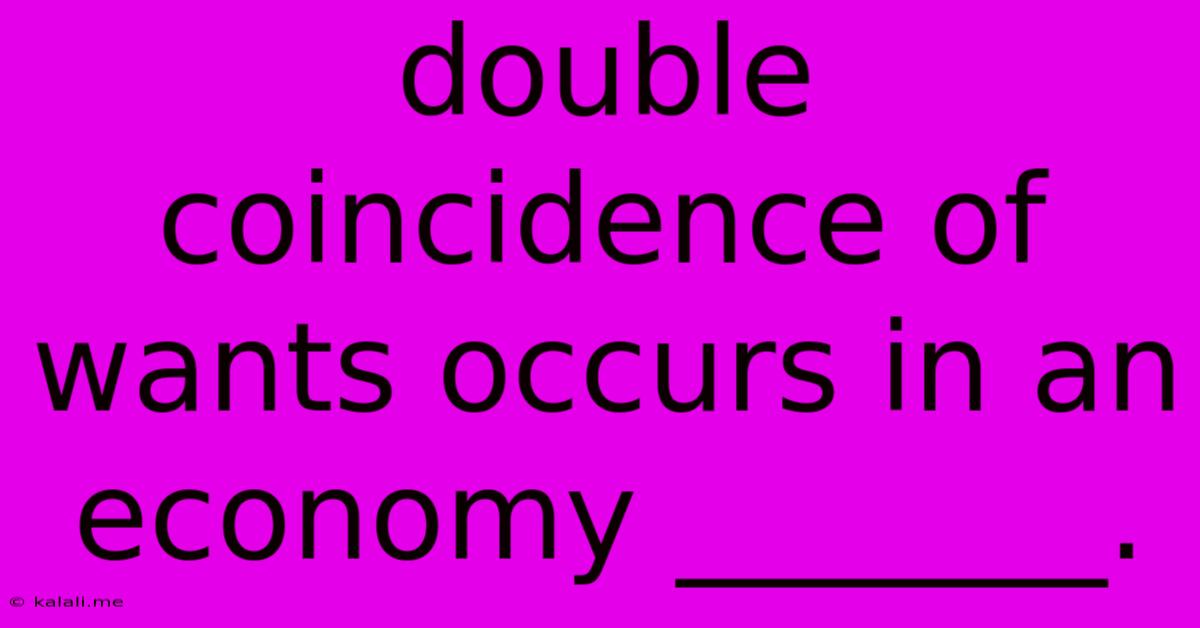Double Coincidence Of Wants Occurs In An Economy _______.
Kalali
Jun 12, 2025 · 3 min read

Table of Contents
Double Coincidence of Wants: A Cornerstone of Barter Economies
A double coincidence of wants occurs in an economy where two individuals each possess a good or service the other desires, enabling a direct exchange without the use of money. This is a fundamental characteristic of barter systems, a system of exchange where goods and services are directly traded for other goods and services without the use of a medium of exchange like money. Understanding this concept is key to grasping the limitations of barter and the evolution of monetary systems.
This article will explore the concept of a double coincidence of wants in detail, examining its implications for economic efficiency and highlighting the crucial role it plays in shaping the development of more sophisticated economic structures.
The Mechanics of a Double Coincidence of Wants
Imagine a simple scenario: a farmer has a surplus of wheat and needs a new pair of boots, while a shoemaker has extra boots and needs wheat for their family's bread. This represents a double coincidence of wants. Both parties have something the other wants, allowing them to directly exchange goods without the need for an intermediary. The wheat and the boots are exchanged directly, satisfying both parties' needs.
Limitations of Barter and the Double Coincidence Problem
While seemingly straightforward, the double coincidence of wants poses significant challenges to an economy reliant solely on barter. The primary issue is the infrequency of such coincidences. The likelihood of finding someone who simultaneously possesses what you need and wants what you have is relatively low, especially in a larger or more diverse economy. This leads to several problems:
- High Transaction Costs: Finding trading partners who satisfy the double coincidence of wants takes time and effort, representing significant transaction costs.
- Reduced Specialization: The difficulty of exchanging goods discourages specialization, as individuals are less likely to focus on producing a single good or service if exchanging it proves difficult.
- Inefficient Resource Allocation: The limitations imposed by the double coincidence of wants lead to inefficient allocation of resources; goods and services might go unused or underutilized due to the lack of suitable trading opportunities.
- Lack of a Common Unit of Account: Barter systems lack a common unit of account, making it difficult to compare the relative value of different goods and services.
The Emergence of Money as a Solution
The limitations of barter systems directly contribute to the emergence of money. Money acts as a medium of exchange, overcoming the double coincidence of wants problem. Instead of directly exchanging goods, individuals can sell their goods for money and then use that money to purchase the goods or services they need. This significantly reduces transaction costs and allows for greater specialization and efficiency in resource allocation. Money also provides a common unit of account, making it easier to compare the value of different goods and services.
Beyond Simple Barter: Indirect Exchange and its Implications
It's important to note that even in economies that primarily use money, elements of direct exchange, or indirect exchange, still occur. For instance, trading favors or skills with neighbors without the explicit use of money. However, these instances are generally limited and don't form the backbone of economic activity in the same way a barter system does.
Conclusion
The double coincidence of wants is a crucial concept in understanding the limitations of barter economies. Its infrequency highlights the inefficiencies of direct exchange and underscores the importance of money as a medium of exchange in facilitating economic activity, promoting specialization, and improving overall economic efficiency. While vestiges of barter may persist, its limitations are clear, explaining the widespread adoption of monetary systems globally.
Latest Posts
Latest Posts
-
Elements On The Right Side Of The Periodic Table Are
Jun 13, 2025
-
The Time And Place Of A Story
Jun 13, 2025
-
The Largest Satellite In The Solar System
Jun 13, 2025
-
Metal In Liquid State At Room Temperature
Jun 13, 2025
-
The Slope Of A Velocity Time Graph Will Give
Jun 13, 2025
Related Post
Thank you for visiting our website which covers about Double Coincidence Of Wants Occurs In An Economy _______. . We hope the information provided has been useful to you. Feel free to contact us if you have any questions or need further assistance. See you next time and don't miss to bookmark.